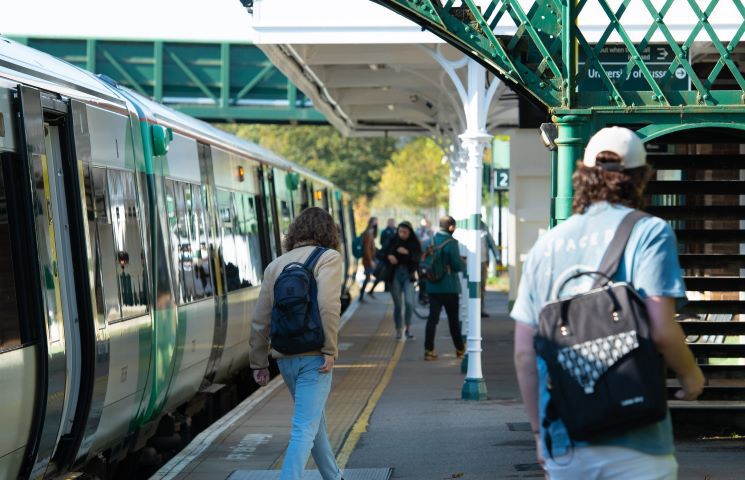Explore Brighton
Check out our famous seaside city just a few minutes from our campus.
One in seven undergraduate students commute to the University of Sussex. Here’s what you need to know about commuting to university, so you can make the right decision for you.

Choosing to live at home while you’re studying can give you greater flexibility, lower costs and the comfort of familiar surroundings.
Whether you’re commuting from nearby or farther afield, read top tips from fellow commuter students, guidance on travelling to campus, ways to get involved in student life and societies, and ideas for making the most of your time in Brighton.
There is no right or wrong way to do university. Take the time to weigh up your options and make a decision that benefits you.
The main considerations are:

You are considered a commuter student if your term-time address is the same as your home address, but there are many different commuter experiences.
About 13.5% of Sussex undergraduate students live more than six miles from campus – almost one in seven, so you’re in good company.
One of the biggest perks of living at home is the chance to save money on accommodation. Many of our students find commuting is a cost-effective way to pursue study while not missing out on social life and student experience.
Katie North, postgraduate student, commutes by train from Chichester
Having lived in campus halls in my first year and in Brighton in my second and third years, I decided to commute from my family home in Chichester for my Masters programme. This decision was primarily financial; the savings were substantial. The main advantages of commuting are the financial benefits and home comforts. My 16-25 railcard has significantly reduced costs. Though driving is an option, I prefer the train as it’s very frequent, avoids traffic, costs less than fuel and parking combined, and allows me to be productive during the journey. The arrangement has also allowed me to maintain my part-time job back home while enjoying the comforts of home life, including spending quality time with my cat! The microwaves in the library have been lifesavers for heating homemade meals.


We know the cost of living is a big consideration. Read our budgeting tips for students.
Our campus is easy to get to whether you’re travelling by train, bus, car or bicycle – although it’s always a good idea to plan your journey ahead of time to avoid delays and disruptions.
| From | Changes | Duration |
|---|---|---|
| Brighton | Direct | 10 minutes |
| Lewes | Direct | 7 minutes |
| Worthing | At Brighton | 50-55 minutes |
| Eastbourne | Direct options | 35-45 minutes |
| Hastings | Direct options | 60-75 minutes |
| Portsmouth Harbour | At Havant and Brighton | 125 minutes |
| Southampton Central | At Brighton | 135 minutes |
| London Bridge | At Brighton | 90 mins |
| London Victoria | At Brighton | 85-100 mins |
You can benefit from travel discounts with a UniZone ticket (for trains to and from Falmer station) or a 16-25 railcard (for travel around the UK).
You can get direct buses to our campus in Falmer from the following places, plus farther afield by changing.
| Starts | Bus number | Duration |
|---|---|---|
| Brighton | 23, 25, 28, 29 | 20-30 minutes |
| Tunbridge Wells | 29 | 60-70 minutes |
| Hailsham | 28 | 60 minutes |
| Lewes | 28, 29 | 20-25 minutes |
| Hove | 25 | 45-50 minutes |
| Hangleton | 5B, 3X | 75-80 minutes |
It’s possible to cycle to the Sussex campus. Riding a bike is a physical activity and you’re responsible for your own safety. Make sure you wear a helmet and bright clothing and that you have lights if cycling in the dark.
It’s possible to drive to our campus, but parking is limited and costs money. Check all travel options to campus.
Kelvin Ankomah, postgraduate student, commutes by bus and train from Croydon
My total commute time is around two hours, but this can vary if there are delays. Commuting can be unpredictable, and even minor delays can significantly impact your schedule. I found that checking train times ahead of time has been crucial in managing my time and reducing stress. To minimise the impact of delays, I plan ahead and leave earlier, usually catching a train two slots before my actual target. This gives me backup options in case of unforeseen delays.

The commute to and from campus gives you the chance to fit in some productivity or simply unwind after your studies.
Rhianon Potter, undergraduate student, commutes by bus from the outskirts of Brighton
Getting out of my warm, cosy bed to make the early bus for a 9am lecture requires a lot of motivation, especially in the dark winter days, but I feel strangely refreshed once I leave the house. Having to get up early gives me a routine which I have grown quite fond of, and I have formed little habits along the way which make things easier – like a coffee stop while I wait for my second bus. I often use the commuting time to relax by listening to music. However, if I have a test coming up, I’ve found the morning commute to be a great time to study using a flashcard app on my phone. It is a good way to study without using too much of my energy, and it takes away the pressure to study in the evening once I am home (and very tired!).

You can expand your study skills on topics such as referencing and writing through our online Skills Hub wherever you are.

You can have a rich and stimulating university experience while living at home. Our scenic campus, with its wide range of cafes and bars, is the perfect place to engage with student life – from societies to sports clubs – and spend time with friends.
Commuting could also give you more flexibility to work your studies around a part-time job or caring for relatives.

Sean Bonney, postgraduate student, commutes by car from Surrey
I commute to university three or four days a week, for lectures or to use the library, and I regularly see friends during these visits. If I’m using the library, I’ll text my friends to ask if anyone wants to grab a coffee for a study break. Commuting hasn’t impacted the sense of community I feel at Sussex. In fact, I have more close friends now than ever before. We have organised social occasions like visits to the Knepp estate and Arundel Castle and a picnic at Ashdown Forest. By commuting, I have found a way to make university work for me. I have gone from someone who never thought they would complete their undergraduate degree, to someone who is having the best time of their life completing a Masters degree. I have grown as a person, and I have formed amazing friendships despite the distance.


Commuting isn’t for everyone. Some students may prefer to live on campus or in privately rented accommodation in Brighton. We have a range of options to suit your needs and circumstances.
Sadie McPherson, undergraduate student, commutes by train or car from Horsham
Commuting felt more comfortable to me than living on campus, even though I was spoilt for choice for accommodation. The commute gave me the independence and control over my life that I needed. I know some people think to fully experience university you must live there, but from my experience that isn’t true. I absolutely feel part of the Sussex community, and everybody I have met has been kind and warm. After my first few classes I had made friends and been added to my course group chat. I have also joined societies and the creative writing magazine. It might be more difficult to be impulsive as a commuter, but it doesn’t mean you can’t have fun. University isn’t a one-size-fits-all-situation – do it your way!

We have a range of housing options, from single flats to shared apartments and townhouses.
Think about your family dynamics, financial situation, and priorities. Don’t compare your situation to that of your friends or anyone else. There is a huge emphasis on the ‘university experience’, and there will always be people urging you to take a certain path. Do what is best for you.” Thahia Uddin
Commutes by train from Bexhill-on-Sea